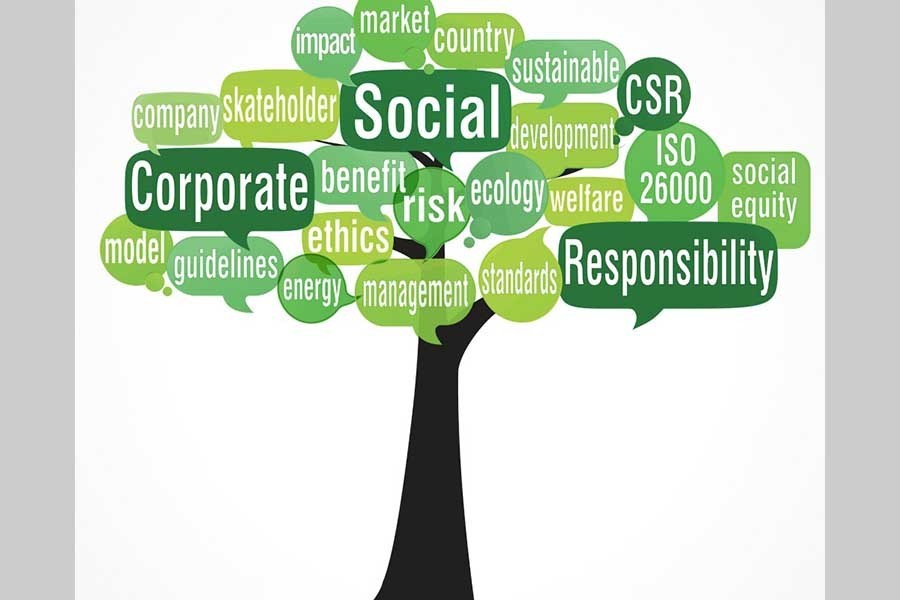
Published :
Updated :

Ever since the Covid-19 pandemic began to unleash havoc on life and livelihood, mobilising resources to help address the situation has assumed a major priority for governments. All over the world, countries - rich and poor - have devised ways mostly in the form of dishing out cash as well as various packages to support the affected people. In Bangladesh, alongside the government's efforts to provide stimulus packages and cash assistance, a very suitable measure could be putting in place the CSR (corporate social responsibility) mechanism in a meaningful manner.
The issue of CSR in the country is often seen in terms of financial spending in a particular area of socio-economic or development activity. It is the state-owned enterprises and commercial banks that are primarily responsible to dole out funds for CSR activities. So far, CSR in Bangladesh has remained confined to certain specific areas, and in doing so, it has not been practised in delivering directly for poverty reduction, or as is now the case, supporting livelihoods of millions. Now that the pandemic is likely to go on with its onslaught - who knows for how long - finding ways to relieve the misery of fast increasing number of vulnerable people must not be reiterated. The fresh surge in Covid infection cases has pushed the poverty rate up and that is why the need for spending CSR funds for the distressed, jobless, vulnerable, homeless and helpless people has become vital.
It is heartening to find that the central bank, of late, has issued a circular asking for allocation of additional CSR funds by banks to help pandemic-hit communities. To carry out this special CSR programme, banks will have to allocate additional 1.0 per cent of their respective net profits of the year 2020 in addition to the existing CSR allocation for the year 2021. Banks have been instructed to report the central bank's sustainable finance department on the transfer of the additional allocation for CSR spending. Besides, banks are also asked to submit a report on the implementation of the special CSR activities by July 30, 2021. Additional CSR spending for the year 2021 would be adjustable in the next three years. The allocated amount, according to the BB circular, must be spent for people living in slums, and for the jobless and homeless people in the city corporations for meeting their daily needs including health expenses. The circular also states that hard-core poor, temporarily jobless and marginal people, who have become unable to lead normal life due to the coronavirus outbreak would be eligible to get the special CSR support. A Bangladesh Bank report showed that the scheduled banks spent close to Tk 5.17 billion in January-June 2020 as CSR fund against their spending of Tk 2.40 billion in the corresponding period of the previous year. However, it is not known where the money was spent and the method of spending.
Clearly, the purpose of CSR at this time is to drive positive social change. Covid-19 has highlighted the need to have a more structured approach, with corporates playing a key role in mitigating public sufferings. But the debate to determine the effectiveness of any previous CSR efforts has thrown up several challenges: finding reliable implementing partners, monitoring and tracking funds, and assessing their impact.
In order to render the BB guideline comprehensive, it is important that it incorporate all priority areas where activities under the CSR funding would be able to address a host of existing as well as emerging socio-economic issues in a sustainable manner. Needless to mention, a good deal of success of the activities will rely on how effectively these are monitored, and in so doing, taking the stakeholders on board would hopefully yield better result.
Although Bangladesh has been practising CSR for sometime now, it is clear that its method and target are both narrowed down to financial allocations by state-owned enterprises and banks only. We hardly come to know whether corporate organisations follow CSR practices - inside and outside their companies. It need not be mentioned that CSR activities by businesses can be best practised in their work culture that in other words means millions of employees directly benefit under the broad facilitating ambit of corporate welfare. It is in this context that CSR is a self-regulating business model that helps a company to be socially accountable to itself, its stakeholders and the public. By practising corporate social responsibility, also called corporate citizenship, companies can be conscious of the kind of impact they are having on all aspects of society including economic, social, and environmental. At a time such as now, engaging in CSR by corporates means their crucial role in redressing a calamity that has affected us all.


 For all latest news, follow The Financial Express Google News channel.
For all latest news, follow The Financial Express Google News channel.